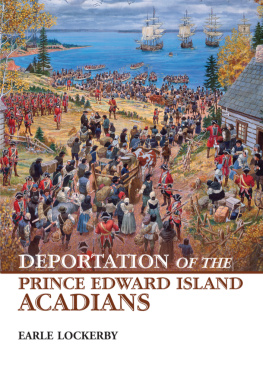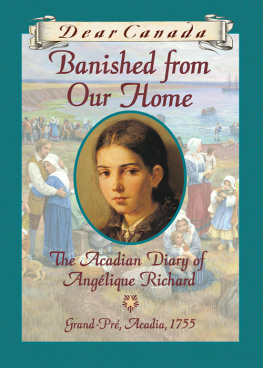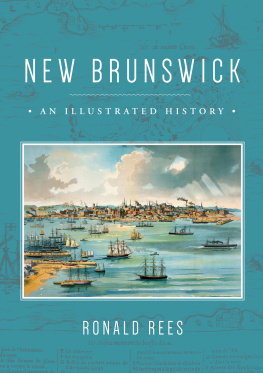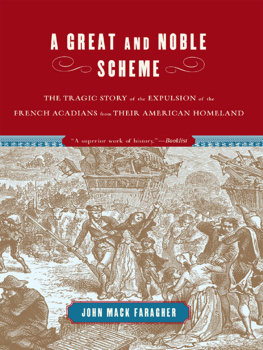The Acadian Diaspora
OXFORD STUDIES IN INTERNATIONAL HISTORY
JAMES J. SHEEHAN, SERIES ADVISOR
The Wilsonian Moment
Self-Determination and the International Origins of Anticolonial Nationalism
Erez Manela
In Wars Wake
Europes Displaced Persons in the Postwar Order
Gerard Daniel Cohen
Grounds of Judgment
Extraterritoriality and Imperial Power in Nineteenth-Century China and Japan
Pr Kristoffer Cassel
The Acadian Diaspora
An Eighteenth-Century History
Christopher Hodson
The Acadian Diaspora
An Eighteenth-Century History
CHRISTOPHER HODSON


Oxford University Press, Inc., publishes works that further
Oxford Universitys objective of excellence
in research, scholarship, and education.
Oxford New York
Auckland Cape Town Dar es Salaam Hong Kong Karachi
Kuala Lumpur Madrid Melbourne Mexico City Nairobi
New Delhi Shanghai Taipei Toronto
With offices in
Argentina Austria Brazil Chile Czech Republic France Greece
Guatemala Hungary Italy Japan Poland Portugal Singapore
South Korea Switzerland Thailand Turkey Ukraine Vietnam
Copyright 2012 by Oxford University Press, Inc.
Published by Oxford University Press, Inc.
198 Madison Avenue, New York, NY 10016
www.oup.com
Oxford is a registered trademark of Oxford University Press
All rights reserved. No part of this publication may be reproduced,
stored in a retrieval system, or transmitted, in any form or by any means,
electronic, mechanical, photocopying, recording, or otherwise,
without the prior permission of Oxford University Press.
Library of Congress Cataloging-in-Publication Data
Hodson, Christopher.
The Acadian diaspora : an eighteenth-century history / Christopher Hodson.
p. cm.(Oxford studies in international history)
Includes bibliographical references and index.
ISBN 978-0-19-973977-6 (hardcover : alk. paper)
1. AcadiansMigrationsHistory18th century.
2. AcadiansRelocationHistory18th century. I. Title.
E184.A2H64 2012
971.5017dc23 2011038848
1 3 5 7 9 8 6 4 2
Printed in the United States of America
on acid-free paper
For Sarah
CONTENTS
ACKNOWLEDGMENTS
Embarking on this project a decade ago, I would never have guessed that writing a book about such terrible events could be so terribly enjoyable. I am pleased now to be able to thank everyone who has helped me along the way.
At Utah State University, Len Rosenband taught me the historians craft. Along with Norm Jones, Mick Nicholls, and Ross Peterson, Len inspired me with his scholarly rigor and creativity while pushing me to refine my own vision of the early modern past. No undergraduate could have asked for better mentors.
Early in my first year at Northwestern University, Tim Breen suggested (in his inimitable way) that a French-speaking historian of early America might do well to look into the Acadian expulsion of 1755. Im grateful to Tim for this advice, and for his tireless work on my behalf in the years that followed. At Northwestern, Russell Maylone, Sarah Maza, Ed Muir, and Ethan Shagan provided wise counsel as this project developed. Thanks also to Aaron Astor, Justin Behrend, Carole Emberton, Patrick Griffin, Michael Guenther, Guy Ortolano, Karen OBrien, and Owen Stanwood, all of whom did much to help me clarify my ideas while offering welcome diversions from the daily tasks of teaching, researching, and writing.
After leaving Northwestern, I had the good fortune to spend two years as a fellow at the McNeil Center for Early American Studies in Philadelphia. Dan Richter and Amy Baxter-Bellamy made the center an almost shamefully pleasant place to work. I owe special thanks to my fellow McNeil Center fellows and fellow travelers Wayne Bodle, George Boudreau, Mike Carter, Yvie Fabella, Charlie Foy, April Hatfield, Hunt Howell, Chris Iannini, Cathy Kelly, Daniel Krebs, Justine Murison, Yvette Piggush, Joanne van der Woude, and Mike Zuckerman.
At BYU, I have again been fortunate to fall in among supportive, smart, and overwhelmingly nice colleagues. Kendall Brown, Karen Carter, Kathy Daynes, Eric Dursteler, Craig Harline, Don Harreld, Andy Johns, Paul Kerry, Rich Kimball, Matt Mason, Shawn Miller, Jenny Pulsipher, Jeff Shumway, and Neil York deserve particular recognition for (a) undertaking the thankless task of commenting on many, many drafts of journal articles, book manuscripts, and grant proposals and (b) helping this newcomer to Provo acclimate to the peculiarities and pleasures of BYU. Im grateful for their efforts on both counts.
Many thanks to the historians of Nova Scotia and the Acadians on whom I have imposed, especially Yves Boyer-Vidal, Rgis Brun, John Mack Faragher, Ronnie Gilles-Leblanc, Jean-Franois Mouhot, Geoff Plank, and John Reid. An equally important group of scholars have listened to or read bits of this book at a variety of conferences and seminars. Bernard Bailyn, Denver Brunsman, Christian Crouch, John Demos, Kate Desbarats, Laurent Dubois, Jack Greene, Franois Furstenburg, Jennifer Denise Henderson, Eric Hinderaker, Ron Hoffman, Ccile Vidal, and Ashli White all offered crucial advice at crucial moments. Brett Rushforth was repeatedly dragooned into service as an expert reader, crack paleographer, and amateur psychoanalyst, succeeding admirably at every turn.
I am very happy to thank the staffs of the following archives: the Acadian Museum in West Pubnico, Nova Scotia, the American Antiquarian Society, the Archives dpartementales de lIlle-et-Villaine, the Archives dpartementales de la Vienne, the Archives nationales, the Archives nationales doutre-mer, the Bibliotheque municipale de Bordeaux, the Centre dtudes acadiennes at the Universit de Moncton, the William L. Clements Library, the Historical Society of Pennsylvania, the Houghton Library, the Library and Archives of Canada, the Library Company of Philadelphia, the Massachusetts State Archives, the McCormick Library of Special Collections at Northwestern University, and the National Archives Mid-Atlantic Region. Without their help, this book could not have been written. No less important were the institutions that supported my research travel, including the American Historical Association, the McNeil Center for Early American Studies, the Society for Colonial Wars, and, at BYU, the College of Family, Home, and Social Sciences and the Kennedy Center.
At Oxford University Press, Susan Ferber guided this book through the various stages of editing with great care, doing her level best to ensure that the silliest of my ideas never made it into the finished product. Alice Thiede produced the wonderful maps that grace its pages. Elements of the book previously appeared in Early American Studies, French Historical Studies, and the William and Mary Quarterly.
From Chicago to Paris, Paul and Sharon Brown, Quinten and Jen Lynn, Adam and Cindy Merrill, Cyrille Minso, and David and Janet Stowell provided juvenile fun, meals, and, on numerous occasions, shelter. My long-suffering in-laws, the Murrays, have been unfailingly supportive. Special thanks are due my parents, Gene and Carol Hodson. They have offered every kindness imaginable over the last decade, buoying me up far more than they realize. My children, Isaac, Libby, and Luke, have never known a father who wasnt strangely obsessed with centuries-old goings-on in Nova Scotia, the French Caribbean, and the countryside of western France. I thank them for all of the joy, noise, and laughter they have brought into my life. Finally, this book is dedicated to my beautiful wife, Sarah. Life with her really is the best of all possible worlds.







